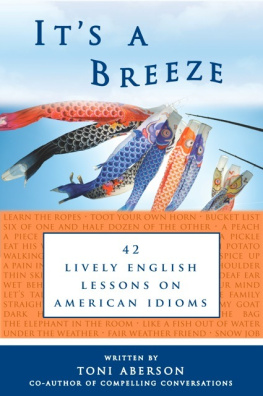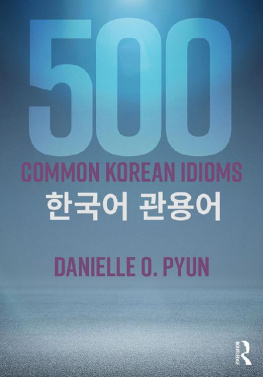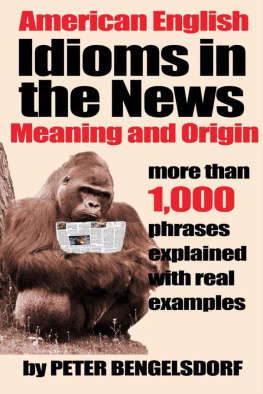
ACADEMIC AND SPECIALIST
Iff Books publishes non-fiction. It aims to work with authors and titles that augment our understanding of the human condition, society and civilisation, and the world or universe in which we live.
If you have enjoyed this book, why not tell other readers by posting a review on your preferred book site.
Recent bestsellers from Iff Books are:
Why Materialism Is Baloney
How true skeptics know there is no death and fathom answers to life, the universe, and everything
Bernardo Kastrup
A hard-nosed, logical, and skeptic non-materialist metaphysics, according to which the body is in mind, not mind in the body.
Paperback: 978-1-78279-362-5 ebook: 978-1-78279-361-8
The Fall
Steve Taylor
The Fall discusses human achievement versus the issues of war, patriarchy and social inequality.
Paperback: 978-1-78535-804-3 ebook: 978-1-78535-805-0
Brief Peeks Beyond
Critical essays on metaphysics, neuroscience, free will, skepticism and culture
Bernardo Kastrup
An incisive, original, compelling alternative to current mainstream cultural views and assumptions.
Paperback: 978-1-78535-018-4 ebook: 978-1-78535-019-1
Framespotting
Changing how you look at things changes how you see them
Laurence & Alison Matt hews
A punchy, upbeat guide to framespott ing. Spot deceptions and hidden assumptions; swap growth for growing up. See and be free.
Paperback: 978-1-78279-689-3 ebook: 978-1-78279-822-4
Is There an Afterlife?
David Fontana
Is there an Afterlife? If so what is it like? How do Western ideas of the afterlife compare with Eastern? David Fontana presents the historical and contemporary evidence for survival of physical death.
Paperback: 978-1-90381-690-5
Nothing Matters
a book about nothing
Ronald Green
Thinking about Nothing opens the world to everything by illuminating new angles to old problems and stimulating new ways of thinking.
Paperback: 978-1-84694-707-0 ebook: 978-1-78099-016-3
Panpsychism
The Philosophy of the Sensuous Cosmos
Peter Ells
Are free will and mind chimeras? This book, anti-materialistic but respecting science, answers: No! Mind is foundational to all existence.
Paperback: 978-1-84694-505-2 ebook: 978-1-78099-018-7
Punk Science
Inside the Mind of God
Manjir Samanta-Laughton
Many have experienced unexplainable phenomena; God, psychic abilities, extraordinary healing and angelic encounters. Can cutt ing-edge science actually explain phenomena previously thought of as paranormal?
Paperback: 978-1-90504-793-2
The Vagabond Spirit of Poetry
Edward Clarke
Spend time with the wisest poets of the modern age and of the past, and let Edward Clarke remind you of the importance of poetry in our industrialized world.
Paperback: 978-1-78279-370-0 ebook: 978-1-78279-369-4
Readers of ebooks can buy or view any of these bestsellers by clicking on the live link in the title. Most titles are published in paperback and as an ebook. Paperbacks are available in traditional bookshops. Both print and ebook formats are available online. Find more titles and sign up to our readers newslett er at
http://www.johnhuntpublishing.com/non-fiction
Follow us on Facebook at
https://www.facebook.com/JHPNonFiction
and Twitter at https://twitter.com/JHPNonFiction
I know all those words, but that sentence makes no sense to me.
Matt Groening
Idioms form an important part of our everyday vocabulary, even if we dont realise it. On a regular basis we might spill the beans or drop the ball, causing someone to hit the roof and there may be Hell to pay as a result. Hopefully, sooner or later they may have a change of heart, we bury the hatchet and wipe the slate clean, and no one is the worse for wear. The origins of these, and many more, everyday phrases are unknown to most, but it doesnt stop us using them freely and frequently as a way of spicing up our interactions. In many cases, especially in context, the meaning is more or less self-explanatory. For example, a phrase like drop the ball largely speaks for itself, since dropping something is rarely good, especially in sporting terms. In plenty of other cases, though, phrases that we may use and understand without a second thought may seem much less obvious when (and if!) we stop to think about why they mean what they do. For instance, why do people who steel themselves to do something bite the bullet? Why do we pull someones leg if we want to tease them? And what on earth does kicking the bucket have to do with dying?
This last example is the one most commonly used to demonstrate the curious nature of idioms. A large part of the problem here is that we cant work out the meaning of many such phrases simply by trying to break them down into their component words (what linguists would call the non-decomposable nature of idioms). Alongside kick the bucket, other prime examples in English include cut the mustard (to do something very well or meet expectations), shoot the breeze (to chat casually with someone), and several more referring to death or dying such as pop your clogs, buy the farm and bite the dust, to name just a few that, on the face of it, make very little sense at all. When such phrases are already known to us they present few problems (most people simply know that kick the bucket means die), but for others, the sentiment expressed by creator of The Simpsons, Matt Groening, at the start of this chapter will be all too familiar. For idioms we have never heard before, it may be that we recognise all of the words being used but have no idea what they mean when they are combined in certain ways.
Idioms are not all the same, however, and at least some seem fairly easy to work out once it is recognised that the meaning is not literal. Whilst a phrase like kick the bucket may seem relatively impenetrable, an example like at the end of the day may be much easier to interpret. Here day refers metaphorically to any situation or discussion at hand, hence the leap of understanding required is relatively small. Other examples fall somewhere in the middle: a phrase like spill the beans is straightforward because we can easily interpret spill to mean reveal even if we dont automatically assume that beans should mean secret. Often there may be clues like this that we can draw on to help us infer a meaning, and metaphor is an important aspect of how we interpret many idioms. When linguists talk about metaphors they simply mean describing one thing in terms of another, so saying something like my boss is a monster would be just as much a metaphor as something more literary like Juliet is the Sun. Some linguists talk about universal ideas or conceptual metaphors that seem to shape the way we talk and think, even if we dont realise it. A common example might be the idea that LIFE IS A JOURNEY (conceptual metaphors are, by convention, written in capital letters), which in turn gives us phrases like reaching acrossroads in our lives, moving on after an unpleasant experience, or crossing that bridge when we come to it. For some idioms, we might therefore be able to identify conceptual metaphors that help us to work out the meaning, such as examples like hit the roof, blow your top or let off steam, all of which seem to reflect the idea that ANGER IS PRESSURE. Similarly, phrases like
Next page









